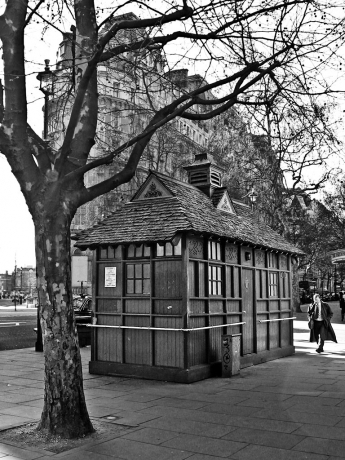a tale of tea, toast and Tulse Hill by
Captain George Armstrong – former soldier, stalwart of the East India Company, resident of St John’s Wood – was about as eminent as Victorians got. So when it was suggested, over drinks at his club one afternoon, that he might like to take charge of the globe, he immediately assented and nipped off to Lock & Co. to order a suitable hat – something between a tricorn and a pith helmet, he rather fancied, with lots of gold braid. His wife’s revelation, during an impromptu bout of conversation three days later, that The Globe was merely the name of a newspaper, left him open-mouthed. Grabbing his coat, he huffed out into the rain in search of a cab – clearly, the situation needed to be clarified, and if that meant an evening trip back to Boodle’s, so be it.
Sadly, although there were cabs a-plenty pulled up in neighbouring streets – London had, by the 1870s, become home to some 7,000 hansoms and growlers, with ranks a recent invention to keep them all neat – the night’s foul weather had caused all drivers to skedaddle. But where on earth had they gone to, leaving their poor horses shivering so unhappily in the cold and wet? Nearby Methodist halls and meeting rooms for the morally conspicuous were, Armstrong soon discovered, distinctly empty of muffled-up cockneys. Bewildered, he sought the advice of a nearby shoeless urchin who, being too malnourished to speak, merely pointed a pathetic finger at the pub opposite. And now Armstrong’s bafflement turned to anger; for not only was leaving one’s cab unattended barely less of a crime than goosing Mr Disraeli, but the rough company of the ale house would, he firmly believed, coarsen these gentle charioteers irrevocably. Hunger and lack of warmth were no excuse; something had to be done. He glanced down at the urchin. “M’boy,” he said, “if I were to give you a shiny sixpence and – ” he briefly lifted the brim of his hat to allow the child to see underneath – “this small slice of cold veal pie, would you take a message to Lord Shaftesbury?”
The urchin did as he was bidden, and an Extraordinary Meeting of Appalled and Eminent Victorians duly called. And thus did the Cabmen’s Shelter Fund – its aim to “erect and maintain shelters to supply temperance refreshments at the lowest prices for metropolitan cabmen on the ranks” – come into being. The first shelter opened in 1874 – in, of course, St John’s Wood – and by 1914 sixty-one of the dark green sheds dotted London, at £200 a pop. Despite, by law, occupying no more space than a horse and cart, each could seat thirteen cabbies without recourse to contortionism or immodesty. An attendant sold simple hot fare, or cooked up grub supplied, and the cabbies, in return, promised not to gamble, drink, swear or reveal how thirteen grown men could fit into such a small space and yet still go home to their wives without blushing. Not for nothing were windows frosted and moustaches kept trim.
Soon, though, Time’s wingèd chariot was touting for fares. Electric cabs were tried in 1897, and by 1901 the first petrol-engined vehicles were plying for trade. Ten years later, all the old horse cabs were gone. Then, in 1919, a cabbie leaving the Pimlico shelter in a slightly distracted state of mind – he later blamed a particularly spicy sausage – missed his turning on Vauxhall Bridge Road and discovered a whole new part of London south of the river. When he returned, five days later – wild-eyed, unshaven, a Crystal Palace FC pennant lolling limply from his lamp – he began to regale his colleagues with tales of all the strange and awful things he’d seen. Scared and bewildered, they hit him repeatedly until he stopped. Then, having spiked his tea with absinthe, they painted him blue and dumped him on the steps of Charing Cross police station. But it was no good: the world had changed forever.
Thirteen shelters still remain, though, bluffly defiant, their evergreen planking unbreached by rumours of salad bars, McDonald’s, or sushi sold with socks in M&S; and, inside them, fuelled by fry-ups and milky tea, cabbies still wax philosophical, as they have done since time immemorial, on the relative merits of Arsenal and Tottenham Hotspur football clubs, the subtle art of tip maximisation, and the simple geometric beauty of the Drury Lane Travelodge cut-through.
[This piece originally appeared in Smoke 10.]


